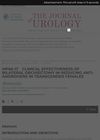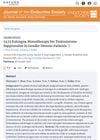
Bilateral Orchiectomy effectively reduces the need for anti-androgen medication in most transgender females.
 24 citations,
March 2002 in “Expert opinion on investigational drugs”
24 citations,
March 2002 in “Expert opinion on investigational drugs” Different anti-androgen medications can help treat excessive hair growth, but the right choice depends on accurate diagnosis.
 1 citations,
August 2013 in “Springer eBooks”
1 citations,
August 2013 in “Springer eBooks” Birth control pills and anti-androgen medications help manage hair growth, acne, and hair loss in women with PCOS.
 December 2022 in “International Journal of Biomedicine”
December 2022 in “International Journal of Biomedicine” Androgens may worsen COVID-19 and hair loss could indicate the disease's severity.
 January 2021 in “Journal of the European Academy of Dermatology and Venereology”
January 2021 in “Journal of the European Academy of Dermatology and Venereology” PrEP doesn't increase STI risk in high-risk men, anti-androgen drugs may lower ICU admission for male COVID-19 patients, a 3-point injection is better for crow's feet, and the 'Geriatric-8' tool could help assess frailty in older skin cancer patients.
 23 citations,
January 2021 in “Journal of Dermatological Science”
23 citations,
January 2021 in “Journal of Dermatological Science” The document concludes that we need more research to understand Telogen Effluvium and find effective treatments.
5 citations,
January 2020 in “Research journal of pharmacy and technology” CBD may help reduce stress and pain in women with PCOS.
 January 2014 in “Journal of Pigmentary Disorders”
January 2014 in “Journal of Pigmentary Disorders” Women's hair gets thinner and grayer as they age, with treatments available for hair loss and graying.
 April 2024 in “Canadian Women s Health Today”
April 2024 in “Canadian Women s Health Today” PCOS treatment focuses on lifestyle changes and specific medications to manage symptoms and complications.
 October 2024 in “Journal of the Endocrine Society”
October 2024 in “Journal of the Endocrine Society” Estrogen alone can lower testosterone in some transfeminine people.
 26 citations,
March 2014 in “Arquivos Brasileiros De Endocrinologia E Metabologia”
26 citations,
March 2014 in “Arquivos Brasileiros De Endocrinologia E Metabologia” The document concludes that proper diagnosis and combined treatments are key for hirsutism management, and weight loss may help overweight patients.
 124 citations,
June 2002 in “Best Practice & Research Clinical Endocrinology & Metabolism”
124 citations,
June 2002 in “Best Practice & Research Clinical Endocrinology & Metabolism” Polycystic Ovary Syndrome likely starts in childhood and may be genetic and influenced by early hormone exposure.
 January 2018 in “Springer eBooks”
January 2018 in “Springer eBooks” The document says that early treatment of Acne Vulgaris is important to prevent scarring and that adult onset acne is common in women, often due to hormonal imbalances.
 123 citations,
May 2020 in “Drug Development Research”
123 citations,
May 2020 in “Drug Development Research” Men's sensitivity to male hormones might affect how severe COVID-19 gets for them.
 38 citations,
July 2012 in “international journal of endocrinology and metabolism”
38 citations,
July 2012 in “international journal of endocrinology and metabolism” Some plant-derived compounds may help with hormonal conditions, but more research is needed to confirm their effectiveness.
 343 citations,
October 2015 in “Endocrine Practice”
343 citations,
October 2015 in “Endocrine Practice” The guide recommends specific methods for diagnosing PCOS and various treatments for its symptoms, while considering the health impacts on adolescents.
 February 2024 in “Journal of Education, Health and Sport”
February 2024 in “Journal of Education, Health and Sport” Different treatments for PCOS should be tailored to the individual, including lifestyle changes and various medications.
 6 citations,
April 2018 in “Obstetrics, gynaecology and reproductive medicine”
6 citations,
April 2018 in “Obstetrics, gynaecology and reproductive medicine” Most women with hirsutism have it because of PCOS, and they need long-term treatment including medication and hair removal to improve their condition.
 11 citations,
July 2017 in “Expert Opinion on Investigational Drugs”
11 citations,
July 2017 in “Expert Opinion on Investigational Drugs” New hair loss treatments may include topical medications, injections, and improved transplant methods.
 5 citations,
June 2015 in “International Journal of Women's Dermatology”
5 citations,
June 2015 in “International Journal of Women's Dermatology” Hirsutism, excessive hair growth in women, is often caused by PCOS and can be managed with medication and personalized treatment plans.
 9 citations,
January 2014 in “Medical Hypotheses”
9 citations,
January 2014 in “Medical Hypotheses” Higher DHT in male baldness may protect against prostate cancer.
 12 citations,
May 1995 in “Australasian Journal of Dermatology”
12 citations,
May 1995 in “Australasian Journal of Dermatology” Hair loss in women can be slowed with treatment, but more research needed for better solutions.
 November 2023 in “Translational Medicine Communications”
November 2023 in “Translational Medicine Communications” Derinat may improve hair growth and quality of life in hair loss patients by reducing oxidative stress.
 December 2023 in “Frontiers in endocrinology”
December 2023 in “Frontiers in endocrinology” Excess androgens may cause PCOS, not just be a symptom.
 17 citations,
June 2017 in “Journal of pharmaceutical sciences”
17 citations,
June 2017 in “Journal of pharmaceutical sciences” Researchers developed a nanomedicine for acne treatment that delivers medication with less irritation and is non-irritating for oily skin.
 116 citations,
December 2017 in “International Journal of Women's Dermatology”
116 citations,
December 2017 in “International Journal of Women's Dermatology” Adult female acne treatment should be personalized, considering individual preferences and pregnancy, using various topical and oral medications while managing side effects and resistance.
 7 citations,
August 2023 in “EClinicalMedicine”
7 citations,
August 2023 in “EClinicalMedicine” Anti-androgens can help manage some PCOS symptoms better than metformin but are not more effective than placebos or birth control pills for other symptoms.
 5 citations,
December 2021 in “Physiological Research”
5 citations,
December 2021 in “Physiological Research” Men, particularly those with hair loss, are more likely to get the virus, and those with prostate cancer may have milder symptoms. Testosterone's role in the disease is unclear, and the virus doesn't seem to harm male fertility. Women with PCOS might be at higher risk. More research is needed.
 3 citations,
June 2004 in “Reviews in gynaecological practice”
3 citations,
June 2004 in “Reviews in gynaecological practice” Early treatment and weight management are important for teenagers with PCOS to reduce symptoms and long-term health risks.
 43 citations,
September 2012 in “International Journal of Dermatology”
43 citations,
September 2012 in “International Journal of Dermatology” Hormonal therapies are safe and effective for treating adult women's acne.





























